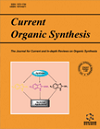-
s Transition Metal-Catalyzed Reactions of Alkynyl Halides
- Source: Current Organic Synthesis, Volume 16, Issue 4, Jun 2019, p. 546 - 582
-
- 01 Jun 2019
Abstract
Background: Transition metal-catalyzed reactions of alkynyl halides are a versatile means of synthesizing a wide array of products. Their use is of particular interest in cycloaddition reactions and in constructing new carbon-carbon and carbon-heteroatom bonds. Transition metal-catalyzed reactions of alkynyl halides have successfully been used in [4+2], [2+2], [2+2+2] and [3+2] cycloaddition reactions. Many carbon-carbon coupling reactions take advantage of metal-catalyzed reactions of alkynyl halides, including Cadiot-Chodkiewicz, Suzuki-Miyaura, Stille, Kumada-Corriu and Inverse Sonogashira reactions. All the methods of constructing carbon-nitrogen, carbon-oxygen, carbon-phosphorus, carbon-sulfur, carbon-silicon, carbon-selenium and carbon-tellurium bonds employed alkynyl halides. Objective: The purpose of this review is to highlight and summarize research conducted in transition metalcatalyzed reactions of alkynyl halides in recent years. The focus will be placed on cycloaddition and coupling reactions, and their scope and applicability to the synthesis of biologically important and industrially relevant compounds will be discussed. Conclusion: It can be seen from the review that the work done on this topic has employed the use of many different transition metal catalysts to perform various cycloadditions, cyclizations, and couplings using alkynyl halides. The reactions involving alkynyl halides were efficient in generating both carbon-carbon and carbonheteroatom bonds. Proposed mechanisms were included to support the understanding of such reactions. Many of these reactions face retention of the halide moiety, allowing additional functionalization of the products, with some new products being inaccessible using their standard alkyne counterparts.


